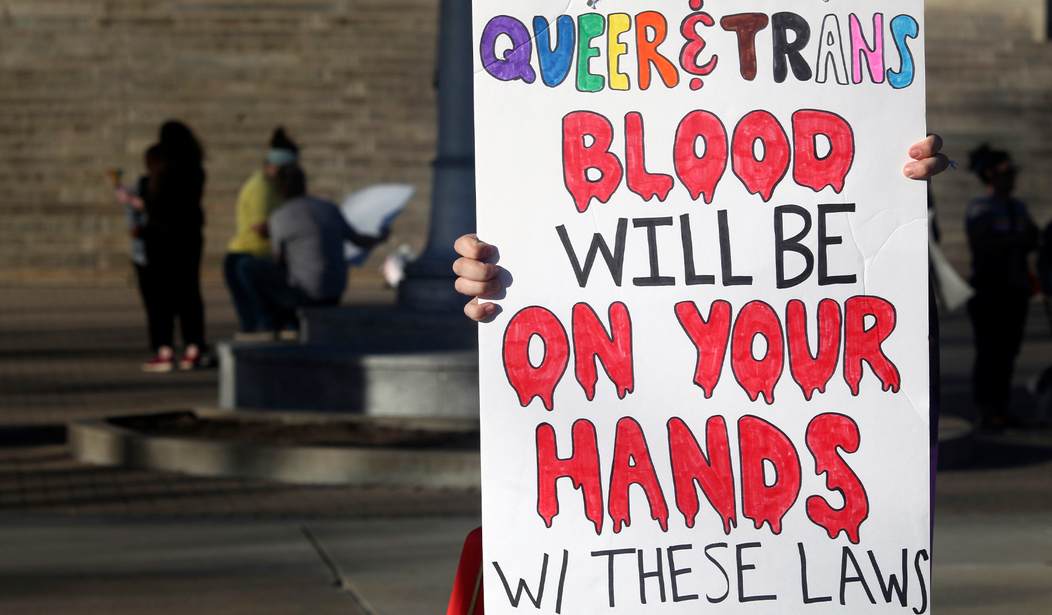I am often blunt and occasionally engage in hyperbole.
Several people, including some whom I respect deeply, think that doing so is mean. I understand why they believe this and respectfully disagree. Here’s why.
On many issues, it is possible to have rational disagreements, and it is totally unproductive to paint people into corners where they are defending their characters rather than defending their intellectual arguments. On these issues, I think it is not only morally correct but also more likely to change minds if you concede that they have respectable arguments with which you disagree.
Such issues include arguments about tax rates, affirmative action, and indeed most policy arguments. I can and do often have passionate disagreements with people on such issues, and I can reach a breaking point where people demonstrate such bad faith that there is no point in conceding anything to one’s interlocutors. But generally speaking, it is simply wrong to question people’s characters and utterly counterproductive.
There are other issues, though, where your intellectual opponents are both engaging in bad faith and in such harmful behavior that it is neither morally required to concede anything and arguably it is a bad idea in the long run. It is only this latter point that is actually worth considering, given that a lot of people will think you are mean when you are blunt. I don’t care what people acting in bad faith think but do care if people who are persuadable are driven away because they think I am being mean.
Such issues in my judgment include issues relating to the grooming of children and Medical Assistance in Dying for people who are not terminally ill–the issues on which I am most blunt and least worried about appearing mean. I also am willing to risk this in cases where people are self-consciously lying in order to fool or even coerce people into harmful behaviors. I include the public health officials who consistently lied during COVID in this category. They knew exactly what they were doing, and it was inexcusable.
Why the difference in approaches? Why risk appearing mean on these issues, especially when in almost all cases the people I am arguing with use the shield of “compassion” to bolster their arguments? Undoubtedly we lose some people to the other side, at least temporarily, solely based on this one factor. Lots of people are persuaded by the “compassion” claims, and they will certainly not respond positively to arguments that seem mean.
There are a couple of simple reasons, and agree with me or not, these are why I am perfectly comfortable with being blunt to the point of appearing indifferent to the feelings of people on the other side.
Direct harm to people is being done, and such harm is being obscured by the method of argument on the other side. In the case of MAID, people are being killed. Literally killed. Because they are depressed, blind, or disabled, or have PTSD. We aren’t arguing about terminal cancer patients–that is the edge case these days, not the norm. I am happy to have a civil discussion about those cases and am sympathetic. Murdering somebody because they are autistic? Nope. That is murder, not a compassionate act.
This is often for the purpose of saving the state money, although the moral shield is “compassion.” In my judgment, the claim of compassion is totally fake. Even in the cases where the practitioner believes they are doing the “right” thing, I simply don’t care that they feel insulted because the level of harm they are doing is so great that their feelings pale in importance.
The doctors who do this should feel bad, not especially in service of punishing them. Rather they need to wake up and realize that killing people–at least those who are not in extremis–is an objective evil.
Having to confront the moral consequences of an act is a good thing, and repentance is miraculous. It does happen, too. Changing the laws promoting this is possible as well. We must get passionate about doing so.
There are lots of people who do evil things and believe they are doing good. Doctors performed lobotomies for decades–the inventor got a Nobel Prize for doing so–and crusaders against the practice were right and proponents were doing evil deeds. If insulting them prevented one lobotomy it was worth it.
Few people describe themselves as evil. Most evil people believe they are doing good. Eugenics was about saving humanity from the genetically deficient, and it was also evil. The justification itself, however high-minded, was cruel.
It is in this category that I put the ghouls who perform experimental medical procedures on children, insisting that this is gold standard care when in fact the evidence is both thin on the ground for this and there is ample evidence that they have no idea what the long-term consequences will be. They claim to be doing good; what they are doing is sterilizing and mutilating children. No amount of scorn heaped upon them is too much given the harm they do.
Peruse the studies on gender and it is clear that they are simply lying, and you can even see in the supposedly pro-trans “I am Jazz” that they have zero idea what they are doing. They are confronted daily with the fact that they are doing real, lasting harm to children. Such people are in fact the moral descendants of Mengele, experimenting on human beings out of ideological zeal, curiosity, or greed.
Yes, greed. Vanderbilt forced doctors and nurses to endorse gender “treatments” because it was good money.
Vanderbilt was apparently concerned that not all of its staff would be on board. Dr. Ellen Clayton warned that "conscientious objections" are "problematic." Anyone who decides not to be involved in transition surgeries due to "religious beliefs" will face "consequences" pic.twitter.com/CgNicrG4Mg
— Matt Walsh (@MattWalshBlog) September 20, 2022
When Vanderbilt hospital administrators threaten their doctors and nurses with negative consequences for refusing to perform “gender-affirming care” because the hospital makes a ton of money off the practice, they are doing evil for money, and demanding others do so too. As much as we hear that medical professionals agree that doing this is the right thing, we can see that many actually do not and yet are coerced into acquiescence.
This isn’t compassion, it is evil. No amount of language citing “care” can hide that fact if people are willing to look. We must force them to look.
If you follow Jazz Jennings’ gender journey, you can see the most zealous proponents of gender treatments readily admit that they have no idea what they are doing and that Jazz is getting harmed regularly and has not benefited from the treatments.
Jazz is profoundly depressed, says “she” does not feel comfortable in her body, and her doctors admit that she will never have sexual fulfillment due to their procedures. In fact, Marci Bowers, who heads WPATH, has clearly stated to children who went on puberty blockers will never have an orgasm.
This is butchery, not “care.” Yet the alphabet ideology demands that children experiencing gender confusion be denied counseling to explore their gender confusion because they characterize it as “conversion therapy.” Children are put on the path of medicalization in a single, 45-minute meeting with a doctor.
It takes more effort to get treatment for migraines than to get puberty blockers, hormones, and eventually surgery to chop off health body parts.
Most European countries–the countries that pioneered such procedures–now ban them except as “experimental” because there is no evidence they work and plenty of evidence that they permanently harm children.
American gender doctors, on the other hand, insist without evidence that these procedures are “life-saving.” This is an obvious self-serving lie. And self-serving liars are evil, and when they are performing medical experiments are following the path of Mengele.
Hence I have no problem calling them liars or worse, not just because it is true, but because without clarity the argument that this is “compassionate” goes unrebutted. That is why so many Democrats, including the president, are pushing this snake oil. They for the most part believe it is compassionate and are refusing to listen to counterarguments.
We must call them out. No amount of gentle persuasion will work; raw political power might.
There is no compassion here, yet compassion is the argument used indiscriminately to justify countless damaging policies. Defunding the police is compassionate towards criminals who are victims, despite the trail of dead bodies left in the wake of criminals routinely put back on the streets. Compassion is the justification for MAID, killing off disabled people for lack of a wheelchair, poor people, or depressed people. It is simply more trouble to actually help them than kill them off.
Simons, a clothing store in Canada, advertised the wonders of assisted suicide by telling the story of a woman who chose MAID, documenting the last month of her life. It was meant to be uplifting. It was a celebration of “compassion.”
Canadian clothes retailer Simons is actually using suicide to market their products.
No, this isn’t made up. It’s part of a sweeping effort to introduce medically assisted suicide as a treatment for mental illness, PTSD and even children with defects in Canada. pic.twitter.com/LdTH8fLq9I
— Ian Miles Cheong (@stillgray) November 27, 2022
What was left out was the fact that she wanted to live, but couldn’t get care for her condition because Canada has too few specialists for her condition due to the financial restrictions of their socialized healthcare system.
Here is how she described her situation to Canadian TV:
Last week, CTV confirmed that Hatch was the same woman who had spoken to them in June about her failed attempts to find proper treatment for Ehlers-Danlos syndrome, a rare and painful condition in which patients suffer from excessively fragile skin and connective tissues.
“I feel like I’m falling through the cracks so if I’m not able to access health care am I then able to access death care?’ And that’s what led me to look into MAID,” Hatch told CTV in June under a pseudonym.
Like more than a million British Columbians, Hatch was left without primary care after her family doctor moved away. And so, after her Ehlers-Danlos diagnosis 10 years ago, Hatch’s treatment had largely consisted of a chaotic and ineffective stream of specialist appointments, none of whom had any background in her condition.
“It is far easier to let go than keep fighting,” she told CTV.
Essentially she was driven to suicide by the state. That is not compassion, yet Simons presented it as a stunning and brave choice.
It was stunning and brave to die in order to save the Canadian healthcare system money.
There are countless other cases similar in kind. The Paralympian who was offered suicide in lieu of a wheelchair lift and veterans offered death in lieu of counseling for PTSD.

Advocates of MAID attack people like me as uncompassionate because we object to these horrors. I feel no compunction speaking plainly: these people are ghouls and should be called out. Killing people because they are a burden to the state is simply wrong, and no amount of sugarcoating can hide that fact if you bother to look.
Many people will recoil, but many others will wake up and realize the horrors being committed. I am willing to sacrifice the ability to soften the hearts of those persuaded by the ghouls out of misguided compassion in order to get those who vaguely realize that this is wrong to stand up and be counted. This is a numbers game because the solutions are political.
MAID is political. Gender-“affirming” care is political. These issues are no longer abstract–the state is pushing these policies, and we must stop the state from doing so. That means recruiting activists.
You will never get potential activists to stand up by using the same arguments as those who want nuance. I could make nuanced arguments–and I don’t dismiss the argument for MAID in extreme cases–but I cannot muster a bit of enthusiasm for the “sterilizing and mutilating kids might be good in some cases” or “killing off the mentally handicapped might be compassionate” arguments. If somebody else can, have at it.
There may be an “on the one hand…on the other hand argument to be made, but nobody is going to be moved to action by an amiable discussion over merlot. And action is needed, right now.
Once we stop offering death as medical care for PTSD I am willing to argue about giving a morphine overdose to somebody in pain and days from death. There are nuanced arguments to be made about the toughest end-of-life care. But we are not arguing about those cases; we are arguing about killing healthy people who are poor, or disabled people who could live full lives if they get proper care.
Until we get rid of the abuses, arguments about difficult decisions for the best end-of-life care are a distraction from the real issue, which is wholesale medical murder.
The one area that frustrates me most is gender care for children. Proponents have succeeded in convincing many that opposing such “care” is attacking gender-confused children when manifestly it is the opposite. It is the doctors who are damaging children irreparably, and lying to cover it up. Somehow those of us who are crying out to save such children and give them appropriate mental health care are the meanies.
I have the utmost sympathy for these kids and want to see them helped. It infuriates me to see adults lure them into lifelong grief for what has been lost and frustrates me no end that the “compassionate” side is seen as the gender benders, not those of us trying to protect children.
They seized the high ground. Unfortunately, I don’t see the people who have been emotionally manipulated into supporting such care as persuadable in the short run. Using the brute force of law to stop the practice seems the only option that will stop the practice quickly, and it should be stopped right away. That means waking up the people who are sufficiently uncomfortable and getting them activated.
Hence my bluntness. It is aimed at just such people, and their numbers are increasing daily. We need raw political power, not to slowly persuade people over decades.
Does that mean abandoning argumentation with people who are primarily motivated by the language of compassion? For me it does. Others can go that route because their goal is different from mine: I simply want it to stop, and if some people think that makes me mean so be it.
Already there are teens who regret what has been done to them–teens who never had the capacity to consent because they are children–and we need to stop this evil before their numbers will be in the tens of thousands. That is the path we are on currently.
If stopping the sterilization and mutilation of tens of thousands makes some people think I am mean, I can live with that. The cost to me is low and the benefit to others is high.
Isn’t that a good enough reason to be blunt, even hyperbolic? I think so.








